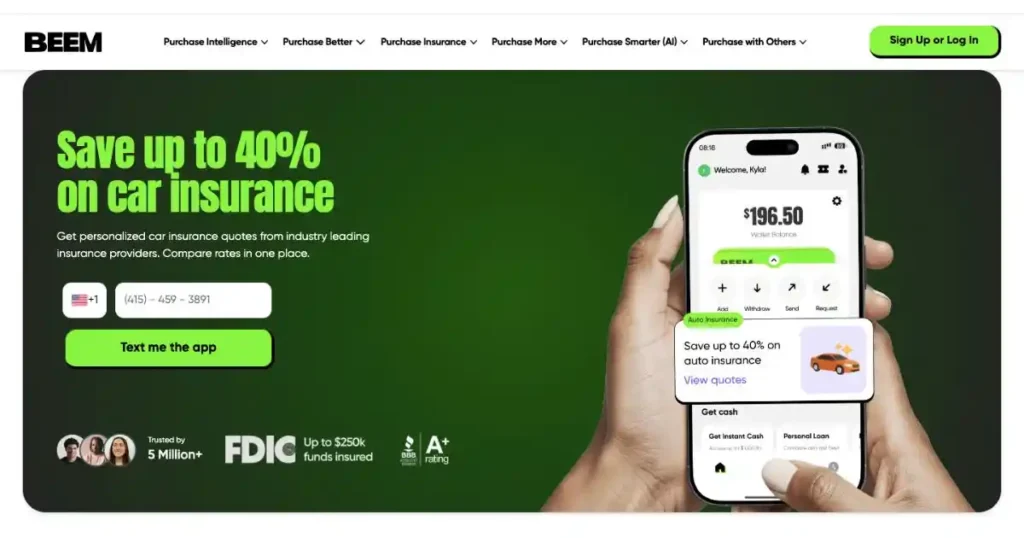Table of Contents
Car insurance has long been based on averages and assumptions—factors like your age, ZIP code, vehicle model, and years of driving history. However, with the rise of digital technology, a new model has entered the market: usage-based car insurance (UBI). These programs use telematics devices or smartphone apps to monitor how, when, and how much you drive. Today, usage-based car insurance apps make it even easier for drivers to track their habits and unlock potential savings in real time.
For many safe drivers, the appeal is clear: fewer miles or safer driving habits could equal lower premiums. However, these programs also introduce questions about privacy and fairness, since your insurance company gains access to real-time driving data. Beem simplifies the process by helping drivers compare UBI programs side by side, so you can evaluate potential savings and risks before committing.
What Is Usage-Based Car Insurance (UBI)?
Usage-based car insurance, often called telematics insurance, shifts the pricing model away from general risk pools and closer to individual driving behavior. Insurers factor in real-world driving data instead of relying only on broad categories such as age or location.
There are two primary types of UBI:
Pay-per-mile insurance: This model charges premiums primarily based on how many miles you drive. It’s particularly attractive to retirees, remote workers, or people with short commutes.
Pay-how-you-drive insurance: This goes further by analyzing how safely you drive. Apps or devices track behaviors such as hard braking, sharp cornering, speeding, phone use while driving, and even what time of day you’re on the road.
Data collection typically happens through smartphone apps, Bluetooth devices, or plug-in telematics units installed in your vehicle. The more accurately your behavior reflects “low-risk” driving, the bigger your potential discount.
Popular Usage-Based Car Insurance Apps in the U.S.
Over the past decade, most major insurers have introduced their own usage-based insurance apps, each offering slightly different features and rewards.
Snapshot by Progressive: One of the pioneers in UBI, Snapshot monitors driving habits and can offer discounts of up to 30% for safe drivers.
DriveEasy by GEICO: This app-based program focuses on phone use, braking, and speed, rewarding drivers who avoid risky habits.
Drive Safe & Save by State Farm – Uses smartphone data and sometimes connected-vehicle systems to provide discounts, especially for low-mileage drivers.
SmartRide by Nationwide: Offers feedback during the policy period and can reduce rates significantly for consistent safe driving.
Root Insurance app: A newer player that relies heavily on app-based monitoring and appeals to tech-savvy drivers comfortable with digital-first policies.
Instead of committing to one insurer, Beem allows drivers to compare multiple UBI options simultaneously, evaluating potential savings and privacy trade-offs.
Pros of Usage-Based Insurance Apps
Usage-based insurance apps offer drivers unique advantages, from fairer pricing models to substantial savings opportunities. They offer safe and low-mileage drivers personalized premiums while encouraging better habits and simplifying mileage tracking.
Potential Cost Savings
One of the strongest incentives for trying usage-based insurance is the possibility of saving money. Discounts often range between 10% and 30%, depending on your insurer and driving performance. For someone paying $1,800 annually, a 25% discount could mean saving $450 per year. Over several years, the savings can add up to thousands of dollars.
Fairer Pricing
Traditional car insurance categorizes drivers into broad groups, often penalizing safe drivers from higher-risk demographics. UBI programs promise fairer pricing by evaluating your actual behavior. For example, a cautious 20-year-old student might receive better rates under UBI than in a standard policy that assumes all young drivers are risky.
Encourages Safer Driving
UBI apps often provide real-time feedback, showing drivers where they can improve. Notifications about hard braking or phone use may help reduce risky behaviors, leading to safer roads. Parents of teen drivers, for instance, often appreciate these tools as an added layer of monitoring and guidance.
Easy Monitoring
Mileage tracking is automated, eliminating the need for manual reporting. Whether you drive infrequently or have multiple vehicles in the household, these apps make it easier to confirm eligibility for discounts without keeping detailed logs.
Cons of Usage-Based Insurance Apps
While usage-based insurance apps promise savings, they also introduce privacy concerns, potential penalties for risky driving, limited availability across states, and unpredictable costs for inconsistent driving habits.
Privacy Concerns
A major drawback is the level of surveillance involved. UBI apps collect GPS data, speed patterns, braking events, and even whether you were using your phone. This data may be stored, analyzed, and sometimes shared with third parties, which can feel intrusive for privacy-conscious drivers.
Penalties for Risky Driving
The same monitoring that can bring discounts can also lead to penalties. If you frequently drive late at night, accelerate aggressively, or brake hard in traffic, your premiums could increase rather than decrease. Unlike traditional policies, where risk is averaged out, your individual mistakes may cost you directly.
Limited Availability
UBI isn’t available everywhere. Some insurers restrict programs by state due to regulatory differences, and not every car or smartphone setup is compatible with the required technology.
Not Always Cheaper
UBI is marketed as a money-saver, but not everyone benefits. Drivers with long commutes or inconsistent habits may find that their monitored behavior doesn’t qualify for discounts, making the effort less rewarding.
Privacy and Data Security Concerns
Usage-based insurance raises important questions about who controls your driving data. Insurers typically collect information such as:
- Location and GPS history.
- Driving speed and acceleration.
- Braking patterns and cornering behavior.
- Phone usage while driving.
Once collected, this data may be stored indefinitely, and in some cases, it could be shared with affiliates or third-party vendors. Drivers may worry about whether this information could be used in unrelated areas, such as employment checks or accident liability disputes.
- To protect yourself, it’s important to:
- Read your insurer’s data-use policy carefully.
- Ask whether your data can be deleted if you opt out.
- Use privacy settings on your phone to limit unnecessary data collection.
Who Should Consider Usage-Based Insurance?
UBI programs are not designed for everyone but offer significant advantages for certain groups.
- Low-mileage drivers: Retirees, remote workers, or students who drive infrequently often see the largest savings.
- Safe, cautious drivers: UBI can reward your habits of avoiding aggressive driving and sticking to speed limits.
- Households with multiple vehicles: A rarely used secondary car can benefit from mileage-based pricing.
People seeking proof of safe driving – UBI offers evidence that you’re eligible for a discount if you believe your current rates are unfair.
Who Should Avoid It?
On the flip side, UBI may not be ideal for everyone.
- Drivers with long commutes – The more miles you drive, the less likely you’ll qualify for substantial discounts.
- Privacy-conscious individuals: If constant GPS monitoring bothers you, traditional insurance may feel more secure.
- High-risk or aggressive drivers: If you frequently speed, brake hard, or drive late at night, your premiums could actually increase.
How Beem Helps You Compare UBI Policies
Sorting through the fine print of usage-based insurance programs can be overwhelming, especially when insurers offer varying discounts, eligibility criteria, and monitoring methods. Beem simplifies this process by comparing policies across multiple insurers in real time.
With Beem, you can:
- Identify which insurers in your state offer usage-based options.
- Compare potential discounts side by side.
- Weigh cost savings against privacy considerations.
Instead of guessing whether UBI will work for you, Beem’s comparison tool makes it easier to find the program that best matches your driving habits.
Conclusion – Smart Savings or Too Much Tracking?
Usage-based car insurance has become one of the most talked-about innovations in the industry. It promises fairer pricing and significant savings for safe or low-mileage drivers. However, it comes with trade-offs, particularly around privacy and data collection.
UBI can be an excellent fit for cautious drivers who value savings and don’t mind sharing their data. However, traditional policies may be more comfortable for those with long commutes, irregular driving habits, or strong privacy concerns.
Ultimately, the best way to decide is to compare options directly. Beem simplifies evaluating multiple usage-based programs, understanding the potential benefits, and weighing them against privacy concerns. By taking a few minutes to compare, you can make an informed decision that balances cost, protection, and peace of mind.
FAQs – Usage-Based Car Insurance Apps
Do usage-based apps always lower insurance costs?
Not always. Discounts depend on your driving habits, mileage, and insurer rules. While many drivers save, those with riskier patterns may not see benefits.
Can my rates go up with usage-based insurance?
Yes. Your insurer may raise your premiums if the app records consistent unsafe driving, such as speeding, harsh braking, or distracted phone use.
What data do UBI apps collect?
Most vehicles collect data on location, speed, acceleration, braking, and phone use while driving. Always review your insurer’s data policy before enrolling.
Are usage-based programs available in every state?
No. Some states restrict telematics insurance, and availability depends on insurer participation in your region.
Can I switch back to a regular policy later?
Yes. Most insurers allow you to opt out of UBI and return to standard pricing, though you may lose any discounts tied to the program.















































